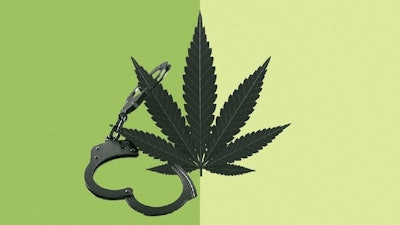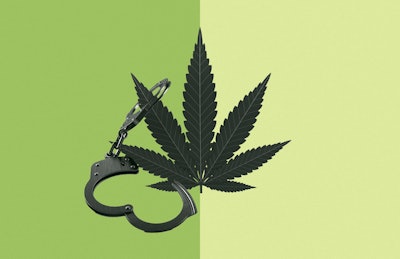

The Agricultural Improvement Act of 2018 (the 2018 Farm Bill) specifically removed hemp from the list of controlled substances under federal law. This exciting change provided an avenue for the legal production and sale of hemp without fear of armed Drug Enforcement Administration agents swooping across fields, seizing hemp or making arrests.
Curiously though, the 2018 Farm Bill has also had some unintended consequences for marijuana growers.
Marijuana and hemp come from the same species, Cannabis sativa L. The legal distinction between hemp and marijuana hinges entirely upon the amount of tetrahydrocannabinol (THC) within a plant. Under federal law, cannabis plants containing 0.3% or less total THC on a dry-weight basis are classified as hemp and are therefore legal. Cannabis plants with more than 0.3% THC are deemed to be marijuana and are still federally illegal.
Legally, it is a pretty straightforward distinction. But practically, it poses new enforcement challenges that few, if any, foresaw.
As the same species of plant, hemp and marijuana look and smell virtually identical. The naked eye cannot typically tell them apart, and currently, even most drug-sniffing dogs—let alone a human nose—would be unable to make the distinction.
The only way to actually tell them apart is through scientific analysis.
When investigating cannabis cases, most law enforcement agencies employ simple field tests that can determine the presence of THC. Historically, these tests were sufficient, since any substance containing THC was illegal. But now that the mere presence of THC alone can no longer distinguish between illegal marijuana and lawful hemp, these tests have quickly become antiquated.
Curiously though, the 2018 Farm Bill has also had some unintended consequences for marijuana offenders.
Laboratories and technology capable of precisely measuring THC levels, which are therefore able to distinguish between marijuana and hemp, exist. But they are expensive and not always readily available to law enforcement. Somewhat ironically, the majority of these types of facilities exist in cannabis-friendly states, as areas without established cannabis industries are less likely to have widespread access to this technology.
As a practical matter, this affects the ability of law enforcement to prosecute most marijuana cases.
Keep in mind that the 2018 Farm Bill did not establish uniform hemp laws that states are required to follow. Although the farm bill lifted the federal prohibition on hemp, states are free to decide how they wish to treat the crop, and state hemp laws are currently far from uniform or static. Many states have warmly embraced hemp; others have taken somewhat of a wait-and-see or test-the-waters approach, and a few have remained steadfast in their prohibitions.
Read more: The Best and Worst States to Grow Hemp
However, as more and more farmers around the nation have been turning their fields over to potentially lucrative hemp crops, and as consumers have shown an increasing interest in hemp-derived products, pressure has mounted for governors and legislators in hemp-unfriendly states to legalize it.
In January, for example, a Republican state representative in Idaho introduced legislation that would align the state’s hemp law with federal regulations. Idaho is one of three states in the country where cultivation or sale of hemp is currently unlawful.
Meanwhile, 33 states plus Washington, D.C., have legalized some form of marijuana, whether for medical or adult use, while 17, including Idaho, have not. Most of the marijuana-unfriendly states are concentrated in the Midwest and the South. But many of these agricultural-heavy states, such as Kentucky and Indiana, have quickly jumped on the legal hemp bandwagon.
The Inability to Distinguish Between Hemp and Marijuana
In legal hemp states, defense attorneys have seized upon a key issue: Can the prosecution actually carry its burden to prove, beyond a reasonable doubt, that the distinctly odorous green plant found in the defendant’s possession is illegal marijuana and not lawful hemp?
Without sufficiently detailed technical analysis, the answer is “no,” and the prosecution cannot make its case.
This issue is upending marijuana prosecutions nationwide. For example, after Texas Governor Greg Abbott signed a hemp bill in June, some Texas District Attorneys began requiring lab tests for marijuana cases. The statute of limitations for marijuana offenses in Texas is two years. Backlogs in state crime labs made clear that the required tests would not be complete before the expiration of the statute of limitations. Consequently, hundreds of cases were dismissed.
Similarly, after Ohio enacted a hemp legalization bill, the Columbus city attorney’s office stopped prosecuting misdemeanor marijuana possession cases after learning that state crime labs currently lack the technology to sufficiently distinguish between marijuana and hemp.
The issue also extends to K-9 enforcement. Historically, a K-9 sniff indicating the presence of Cannabis sativa L. was sufficient probable cause for law enforcement to conduct a search. But in states with legal hemp, in the absence of additional evidence indicative of criminal activity such as bloodshot eyes or confusion, the presence of Cannabis sativa L. alone is likely insufficient grounds for a search.
Under what is known as the “fruit of the poisonous tree doctrine,” evidence obtained from an illegal search, which can include a search unsupported by probable cause, may result in the evidence being inadmissible in court. Without evidence of a crime, a prosecutor has no case.
For example, a recent notable case in the Colorado Supreme Court, People v. McKnight, upheld the suppression of drug evidence on the grounds that because Colorado has legal marijuana, the alert from a dog trained to smell drugs cannot inherently support an inference that a crime has been committed.
So even in a case where laboratory analysis showed that the substance seized by law enforcement was, in fact, illegal, the prosecution could still lose if the search that uncovered such substance was not supported by probable cause. Thus, by complicating the legal analysis over the lawfulness of cannabis-related searches, hemp legalization creates new and additional challenges for marijuana prosecutions.
State Reactions
These enforcement challenges are causing some lawmakers to attempt to craft hemp laws in a way that does not hinder the enforcement of marijuana prohibitions.
Smokable hemp products, such as hemp cigarettes, for example, are gaining popularity nationwide. These products look and smell virtually identical to their illegal (in many states) brethren. Because smokable hemp makes it almost impossible for law enforcement to determine the legality of what someone is smoking in real time, some states are banning it outright.
Texas, for example, legalized hemp cultivation, production and sales, but prohibits smokable hemp. North Carolina is also wrestling with smokable hemp laws. The Midwest Hemp Council recently sued Indiana over criminalizing smokable hemp in a lawsuit that is still moving through courts, claiming the state unlawfully banned a product that is federally legal. Kentucky’s hemp regulations ban smokable hemp, smokeless hemp products like chew and dip and hemp material meant for tea.
As hemp cultivation continues to flourish across the United States, enforcement of marijuana prohibitions will likely grow increasingly difficult. Without proper laboratory analysis, marijuana prosecutions may prove to be unwinnable cases. Governments could even face expensive and undesirable litigation relating to unlawfully seized property, damage to lawful property and wrongful criminal prosecutions.
Political opinions around cannabis are shifting dramatically. In the 2020 democratic presidential race, every current or former candidate at least supports marijuana decriminalization measures, while most (except former New York City Mayor Michael Bloomberg) support its legalization on some level. Meanwhile, more and more states continue to embrace legal cannabis and hemp regulatory regimes without suffering pronounced negative consequences.
The combination of shifting public opinion, successful state-level cannabis experiments and practical enforcement challenges caused by the widespread legalization of hemp will continue to put pressure on governments at all levels to reassess cannabis prohibitions. At the very least, the increasing difficulties faced by law enforcement will necessitate a cost-benefit analysis regarding the resources being dedicated to enforcing cannabis prohibitions.
The legalization of hemp did not consequently legalize marijuana, but widespread legal hemp represents another breakdown in the history of widespread cannabis prohibition and creates significant new challenges for enforcing marijuana prohibitions.














